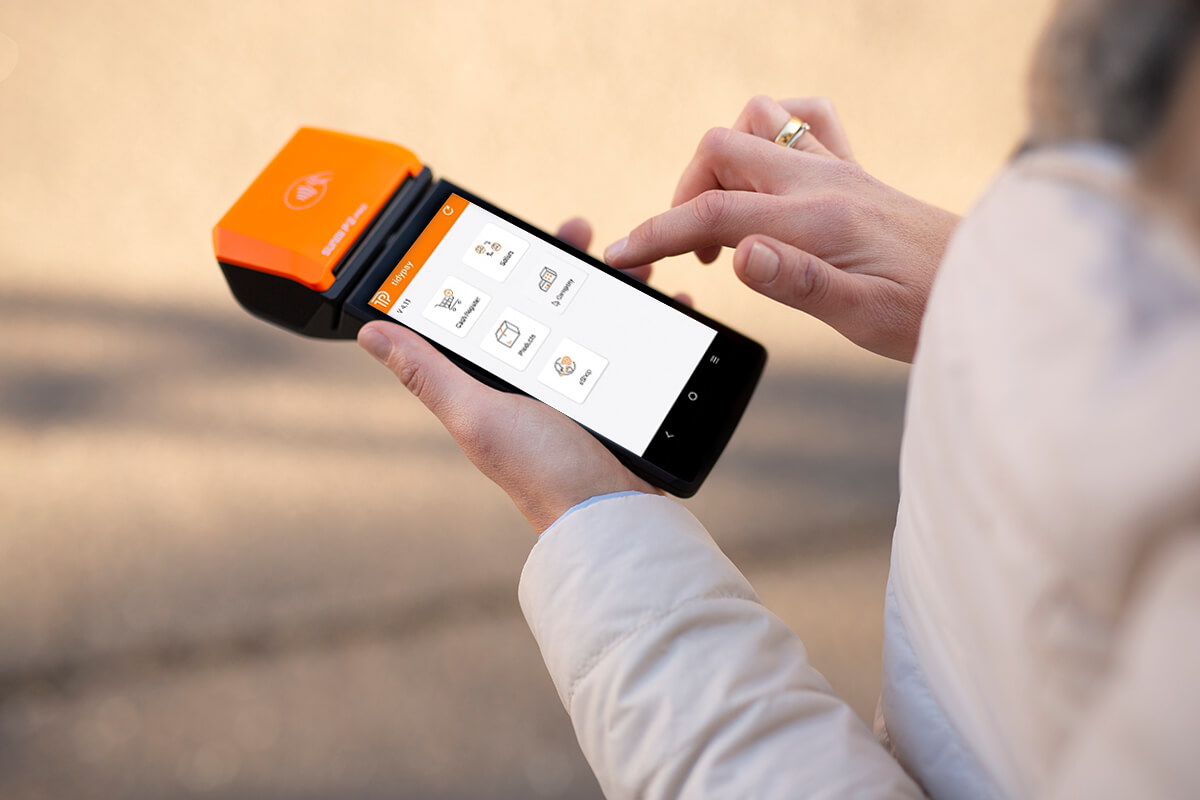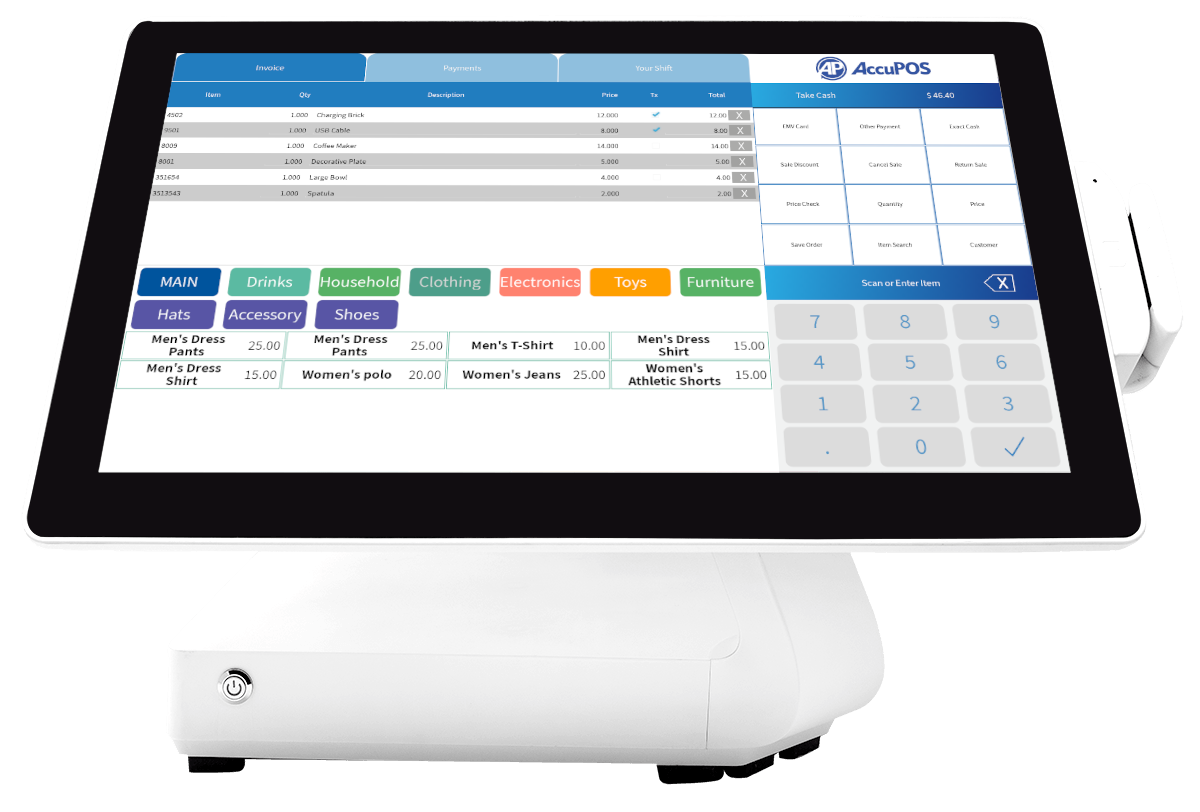Not known Incorrect Statements About Pos

Restaurant POS: Retail Point-Of-Sale Solutions Streamline Transactions
Little Known Questions About Pos Systems.

Hardware Parts of a Point of Sale System What makes a POS system tick? It's not simply software application; the hardware plays a starring function. Consider it as the body to the software's brain. Without the right hardware, even the most sophisticated POS software application is just a quite face. Important POS Hardware So, what are the must-haves? Let's break it down. The main processing unit, often a computer or tablet, is the heart of the operation. The screen or touchscreen show enables staff to engage with the system. A barcode scanner speeds up the checkout process. Remember the days of by hand getting in each code? The dependable receipt printer supplies customers with a record of their purchase. A cash drawer keeps your money safe and arranged. A card reader permits clients to pay with credit or debit cards. Diving Deeper: Beyond the Fundamentals But wait, there's more! Depending upon your organization, you may need specific hardware. For example, a dining establishment may integrate kitchen printers to relay orders, while a retailer might use label printers for item tagging. Ever wonder how your regional bakeshop instantly prints those delicious-looking labels? Choosing the Right Hardware: A Balancing Act Choosing the best hardware isn't almost buying the most expensive here devices. It's about discovering the sweet spot between performance, resilience, and budget. A small company simply starting may go with a more fundamental setup, while a high-volume merchant will need robust, high-performance devices. Is it better to buy brand-new or used? Consider your choices thoroughly. A brand-new system uses the most current technology and guarantee security, however a reconditioned system can conserve you cash. The Future of POS Hardware What does the future hold? Anticipate to see much more combination with mobile phones, biometric scanners for staff member authentication, and advanced analytics dashboards showed on larger, clearer screens. Think of a world where inventory is immediately upgraded in real-time as items are scanned-- a world where you can track your very popular product from throughout the world. The possibilities are limitless, and the hardware is continuously evolving to satisfy the demands these days's businesses. Are you all set to update your point of sale system?
Software Features and Capabilities: The Heart of Your POS System
Ever view a seasoned barista move through a hectic morning rush? Their trick isn't just caffeine; it's a smooth dance with their POS system. The software application is the conductor of your company symphony, orchestrating everything from sales to stock. But what notes should you be listening for? What capabilities truly matter in today's market?
Inventory Management: Beyond Counting Beans
Forget spreadsheets that haunt your dreams. Modern POS systems use real-time stock tracking, alerting you when your stock of artisanal coffee beans dips precariously low. Consider it as a digital guardian angel, avoiding those uncomfortable "Sorry, we're out!" minutes to clients. What if you could also predict demand based on historic data? Numerous systems now use forecasting tools, a powerful weapon versus overstocking and lost sales. This assists prevent the predicament of running out of popular products or collecting excess stock of slow-moving products, both of which can constrain money circulation and space.
Sales Reporting and Analytics: Deciphering the Data
Sales information is the new gold, and your POS system is the miner. Forget just knowing just how much you sold today. Dive deep into the information to uncover patterns, determine your best-selling products, and comprehend consumer behavior. Which menu item pairs completely with the day-to-day special? Which promotion resonated most with your customers? These insights are not simply interesting; they're actionable intelligence. Without trusted sales reporting, navigating the complexities of service decision-making becomes like sailing without a compass, increasing the possibility of mistakes and missed out on opportunities.
Customer Relationship Management (CRM): Building Bridges, Not Walls
Remembering a regular client's name and favorite order is lovely, but scaling that personal touch is difficult. POS systems with CRM capabilities allow you to track consumer purchase history, preferences, and even birthdays. Picture immediately providing a discount on their birthday-- a small gesture that cultivates loyalty and encourages repeat organization. There is the prospective snag of poor information quality, which can lead to incorrect customer profiles and inadequate marketing efforts.
Payment Processing: Simplifying the Deal
The checkout experience can make or break a sale. Seamless combination with various payment approaches-- credit cards, mobile wallets, even copyright-- is non-negotiable. Can your system deal with split payments? Does it provide safe and secure tokenization to secure consumer data? A cumbersome payment procedure is like hitting a sour note in your service symphony, potentially interrupting the entire efficiency. Ensuring compatibility with evolving payment innovations and adherence to security requirements are critical for maintaining consumer trust and functional efficiency.
Staff Member Management: Keeping the Team in Sync
From clocking in and out to managing approvals and tracking efficiency, employee management includes simplify operations and enhance accountability. Is scheduling a problem? Numerous POS systems offer incorporated scheduling tools, enhancing staffing levels based upon anticipated demand. A common challenge that is typically neglected is the difficulty of incorporating worker management functionalities with payroll systems, which can lead to mistakes and ineffectiveness in wage estimations.
Advanced Features: Leveling Up Your Operations
- Table Management: Ideal for dining establishments, this feature permits you to envision your dining room, track table status, and handle appointments.
- Loyalty Programs: Reward your best clients and encourage repeat company with incorporated commitment programs.
- Online Purchasing Combination: Effortlessly integrate your POS system with online ordering platforms to expand your reach.
Selecting the best POS system is about more than just performance; it has to do with finding a partner that can grow with your company. Consider your existing requirements, expect future growth, and do not be scared to ask the tough questions. The right software application can transform your company from a disorderly cacophony into an unified masterpiece.
Industry-Specific POS System Applications
Think about the local bakeshop, bustling with early morning clients yearning fresh croissants. A generic POS system might handle transactions, but can it handle complicated dishes, track ingredient inventory, or automatically adjust production schedules based on sales information? Most likely not. That is where the charm of industry-specific POS systems shines.
Restaurants and Hospitality
For dynamic restaurants, speed and precision are paramount. The number of times have you seen servers handling orders, adjustments, and splitting costs, all while attempting to provide excellent service? A restaurant POS system improves these procedures, enabling for table management, kitchen area order tickets, and even online purchasing integration. These systems often include functions like ingredient-level stock tracking, vital for handling food expenses and minimizing waste. Ever question why your preferred meal is often unavailable? It may originate from an absence of proper stock management.
- Table Management
- Kitchen Order Tickets
- Online Ordering Integration
- Ingredient-Level Inventory Tracking
Retail Solutions
Retail, with its diverse stock and customer interactions, demands a different set of tools. Imagine a boutique clothes store struggling to track sizes, colors, and seasonal collections utilizing a basic checkout system. An industry-specific retail POS system provides features like barcode scanning, customer commitment programs, and in-depth sales reporting. These systems can even incorporate with e-commerce platforms, providing a seamless omnichannel experience for clients. Did you know some retail POS systems can predict future sales trends based upon historic information? Now that is powerful!
The Hazards of a Mismatch
Choosing the wrong POS system can create considerable functional obstacles. A clothing shop using a dining establishment POS, for example, would find it inappropriate for handling inventory with sizes and colors. The absence of proper reporting and analytics could result in mistaken purchasing decisions and lost revenue. The result might be similar to attempting to fit a square peg in a round hole.
Secret Factors to consider
Choosing an industry-specific POS system requires careful examination. Think of your service's distinct needs and operational workflows. Does the system incorporate with existing software? Does it use the needed reporting capabilities? Is it scalable to accommodate future development? A well-chosen POS system is not simply a transaction tool; it's a strategic asset that can drive performance, enhance client complete satisfaction, and ultimately, improve your bottom line. Remember, it is a financial investment in your company's future, not just a cost.
Security Considerations for Point of Sale Systems
Ever heard the tale of the mom-and-pop shop that lost everything because of a single, overlooked security flaw in their POS system!.?. !? It's a cautionary tale, and it highlights a crucial element typically eclipsed by the attraction of elegant features and structured operations. The reality is, a POS system is only as good as its security. What good is a system that crunches numbers in a flash if it enables bad guys to swipe client's information simply as rapidly?
The Vulnerability Minefield
The digital landscape is a battleground. Every POS system, no matter size or sophistication, is a prospective target. Are you genuinely prepared for the threats hiding around the corner? The genuine pinch comes when you find that your outdated software application has a gaping hole that hackers can exploit, turning your service into an unwitting accomplice in identity theft. The trouble is that hackers are crafty and are always changing their methods.
Common Security Gaps and Expert Tips
- Weak Passwords: "Password123" isn't cutting it. Usage strong, distinct passwords for all POS system accounts and change them frequently. Two-factor authentication is a must.
- Unsecured Networks: Your Wi-Fi is like leaving the front door open. Protect your network with strong file encryption (WPA3 if possible) and think about a different network for your POS system.
- Out-of-date Software Application: Software application suppliers patch security holes all the time. Stopping working to update resembles inviting trouble. Establish automatic updates or schedule regular maintenance.
- Staff member Training: Your staff is your first line of defense. Train them to acknowledge phishing attempts, protect passwords, and report suspicious activity.
Data Encryption: Your Guard Against the Dark Arts
Think of data file encryption as a secret code. It scrambles sensitive details, like charge card numbers, making it unreadable to unauthorized users. Without encryption, your consumers' financial details resemble sitting ducks, ripe for the selecting by cybercriminals. It's not almost securing your clients; it's about safeguarding your track record and preventing large fines.
PCI Compliance: The Rulebook You Can't Disregard
If you accept credit cards, you're bound by the Payment Card Market Data Security Requirement (PCI DSS) It's a set of security requirements designed to safeguard cardholder data. Failing to comply can result in fines, penalties, and even the loss of your ability to process charge card payments. It's a headache, yes, however it's an essential one. Consider PCI compliance as the expense of doing business in the digital age.
Consider this: every transaction processed through your point of sale is a possible entry point for harmful stars. By implementing robust security measures, you're not simply securing your company; you're securing your consumers' trust and making sure the long-term practicality of your operations. The security of your POS system isn't simply a technical problem; it's a service important. It requires continuous vigilance, proactive measures, and a commitment to remaining ahead of the curve.
Comments on “See This Report on Point Of Sale Systems”